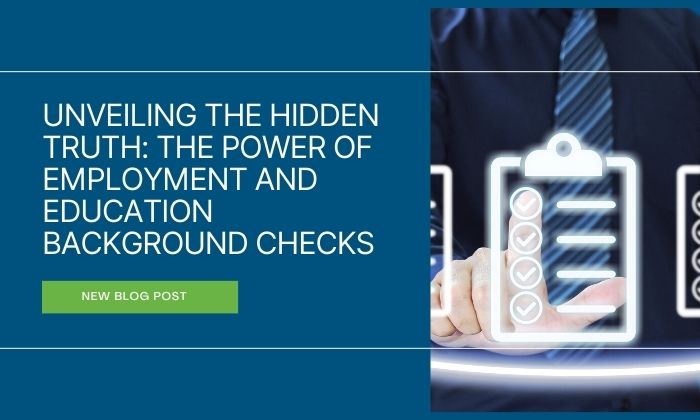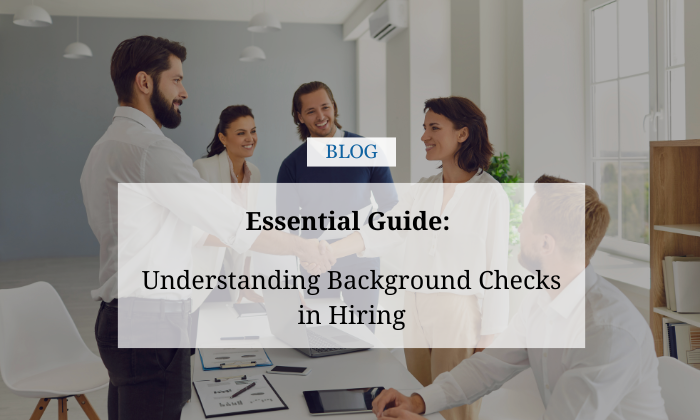When conducting background checks on potential hires, confirming their educational background becomes a crucial step.
Some individuals tend to exaggerate their academic achievements and degrees when crafting their resumes. Neglecting to verify the educational credentials of candidates exposes your company to the possibility of bringing on board individuals who lack the necessary qualifications and are not truthful, posing potential risks to your business and its reputation.
According to a survey carried out by ResumeLab, 36% of respondents openly confessed to embellishing information on their resumes. Shockingly, only a third of those who admitted to such fabrications were identified.
The prevalence of misrepresentations in job applications underscores the importance of employers diligently vetting candidates. Failing to conduct thorough background checks may lead to the hiring of unqualified individuals, leaving companies susceptible to claims of negligent hiring.
Securecheck360
Here at Securecheck360, we’re experts in delivering reliable, fast turnaround and affordable Employment Background Screening Services, serving businesses of all sizes across the globe. Our customized solutions are finely tuned to meet the unique requirements of small, mid-sized, and large organizations. We’re dedicated to equipping companies with the vital tools and insights they need to make well-informed hiring choices. As one of the leading background verification companies, we’re committed to supporting even small businesses as trusted background check companies for small businesses to ensure they have the confidence to build the best teams for their success.
To know more about our services, book your free demo today!
What Is Education Verification?
Employers engage in education background checks to authenticate candidates’ claimed certifications, training, and educational backgrounds, aiming to uncover any potential misrepresentations.
Consumer reporting agencies (CRAs) are often enlisted by employers to conduct education background checks on their behalf. These services play a crucial role in confirming whether applicants genuinely hold high school diplomas, vocational certifications, or undergraduate and graduate degrees.
Education background checks unveil key details such as the dates of attendance, majors pursued, and degrees obtained by candidates at high schools and universities, both within the U.S. and internationally. Notably, these checks are not designed for verifying professional licenses; dedicated background screening services are available for such purposes, like professional license verification.
Education verification services play a vital role because some applicants distort their qualifications, embellish them, or exaggerate them in an attempt to secure positions for which they lack the necessary qualifications. Instances include false claims of attending schools or earning degrees that were never attained.
Why Should Employers Verify an Applicant’s Education?
Here are several compelling reasons to incorporate education verification into your background screening process when hiring:
- Ensure Full Qualification: When bringing new employees on board, it’s crucial to confirm their full qualification and ensure they possess the necessary education to excel in their roles.
- Avoid Negligent Hiring Liability: Confirming education and qualifications is essential to prevent potential negligent hiring lawsuits. Verifying that employees have the necessary skills and knowledge protects your company from harm caused by incompetence.
- Spot Fake Degrees and Institutions: The prevalence of diploma mills, especially online, has increased. Education verification services help identify the authenticity of claimed institutions, exposing fake credentials and degrees, such as counterfeit nursing diplomas.
- Verify Required Certifications, Degrees, and Licenses: Certain industries demand specific degrees, certifications, and licenses. Failing to verify these qualifications may expose your company to liability, particularly in fields like healthcare, education, law, fitness, and cosmetology.
- Detect Misrepresentations: Applicants may misrepresent their educational background by claiming degrees or attending prestigious schools they never did. Education verification aids in quickly identifying such misrepresentations and ensuring the hiring of honest candidates.
- Accelerate the Hiring Process: Traditional verification methods can be time-consuming. Education verification services, like those offered by securecheck360, provide quick and accurate results, allowing you to streamline the hiring process and make informed decisions promptly.
- Ensure Compliance with Privacy Laws: Protecting sensitive applicant information is paramount. Choosing services that comply with privacy laws, such as those provided by Securecheck360, ensures data security through encryption, fostering confidence in your hiring practices.
Integrating education verification into your hiring procedures not only safeguards your company from potential risks but also ensures a faster, more efficient, and compliant recruitment process.
How to Spot a Fake Degree on Your Applicant’s Resume
Detecting a counterfeit degree from a diploma mill isn’t always a straightforward task. Discerning the legitimacy of a listed educational institution’s accreditation from a resume alone can be challenging. However, there are subtle indicators that can raise suspicions and suggest the possibility of fraudulent degrees. Consider the following warning signs:
- Degrees Listed Out of Order: Education typically follows a structured progression, such as high school diploma/GED, followed by an associate’s or bachelor’s degree, and then advanced degrees. If a candidate asserts having an advanced degree without a bachelor’s or claims a bachelor’s without a high school diploma or GED, it may signal a credential from a diploma mill.
- Rapid Degree Attainment: Genuine academic achievements often take a specific duration—around three to four years for a bachelor’s, one to two years for a master’s, and four or more years for a Ph.D. If an applicant alleges completing a degree unusually fast or lists multiple degrees earned in the same year, a closer examination is warranted.
- Degrees from Geographically Distant Schools: While legitimate online programs exist, claiming a degree from an institution significantly distant from the applicant’s work or residence raises concerns. Verifying the accreditation of such institutions becomes crucial, as lack of accreditation may indicate a diploma mill credential.
- Similar School Names: Be cautious if an applicant declares a degree from an institution with a name resembling a renowned university in a different state. Some legitimate institutions have similar names to prestigious ones. It’s important to investigate further to confirm accreditation, as diploma mills often create false documents with names akin to reputable institutions.
- Foreign Institutions and Unusual Residency: Claims of degrees from foreign institutions merit extra scrutiny. If an applicant states having a degree from a country where they haven’t resided, it’s advisable to conduct a thorough investigation. Some diploma mills fabricate credentials from non-existent or unaccredited institutions abroad.
Spotting these red flags requires a diligent review of applicants’ educational claims to ensure the integrity of the hiring process and safeguard against potential misinformation.
What Does an Education Background Check Show?
Education background checks are essential for verifying the accuracy of an applicant’s educational claims. They confirm details such as schools attended, attendance dates, and obtained certificates or degrees. While these checks typically do not include GPA information, employers requiring this detail can request candidates to provide official transcripts for a more comprehensive assessment of academic performance.
The FCRA and Education Verifications
The Fair Credit Reporting Act (FCRA) is a federal law that governs the information provided by Consumer Reporting Agencies (CRAs) to employers.
While the FCRA imposes limitations on CRAs regarding certain convictions, judgments, arrests, and similar information, it does not impose restrictions on reporting educational history information.
For instance, the FCRA prevents CRAs from reporting liens, judgments, and arrest records older than seven years for most candidates, excluding positions with salaries below $75,000. However, this time constraint doesn’t apply to an applicant’s educational history. Your education background check can encompass any number of years in a candidate’s life as necessary.
How Do Employers Verify Education?
1. National Student Clearinghouse: Some employers use the National Student Clearinghouse for educational verification, but it comes with drawbacks like account setup challenges and potential audits. Unlike securecheck360, it requires more hands-on involvement.
2. DIY Education Verification: Verifying credentials independently involves contacting institutions, researching accreditation, and asking candidates for proof. This process is time-consuming and may lack accuracy. securecheck360 offers a faster, more reliable alternative.
3. Partnering with a 3rd Party Background Check Provider: Opting for a third-party provider like securecheck360 ensures swift education verification, often within hours. To initiate, notify the applicant, obtain consent, gather details, and order verification. This approach saves time and verifies claimed education history reliably through established databases and direct institution checks.
How Long Does Education Verification Take?
The time it takes to complete an education verification check varies based on the method chosen.
If you opt for a DIY approach, reaching out to each institution listed by the applicant can be time-consuming and may result in delays. Additionally, the process might yield incomplete information if the candidate omitted certain institutions. Waiting for responses from high schools, colleges, and universities could extend the timeframe to weeks.
In contrast, partnering with Securecheck360 allows for a quicker turnaround, with education background checks typically returned within two to four days. Leveraging our access to extensive education databases and advanced technology enables us to provide results faster than many other providers.
How Far Back Do Education Background Checks Go?
As mentioned earlier, the FCRA does not impose time constraints on the depth of an education background check. A Consumer Reporting Agency (CRA) can delve into an applicant’s educational history throughout their entire life. Collaborating with securecheck360 for background checks ensures that the reports you obtain adhere to all pertinent regulations and rules in your local area.
What are the Legalities Around Education Verification?
When employers enlist a Consumer Reporting Agency (CRA) for background checks, strict adherence to federal and state laws is crucial in making hiring decisions. Understanding the FCRA and EEOC regulations is essential, ensuring proper notification and consent procedures.
The EEOC mandates uniform background checks for all applicants, irrespective of protected characteristics. Compliance with local, state, and federal laws is necessary, and hiring someone with misrepresented educational qualifications poses risks. Collaborating with securecheck360 ensures background checks align with legal requirements, providing a comprehensive and compliant approach.







